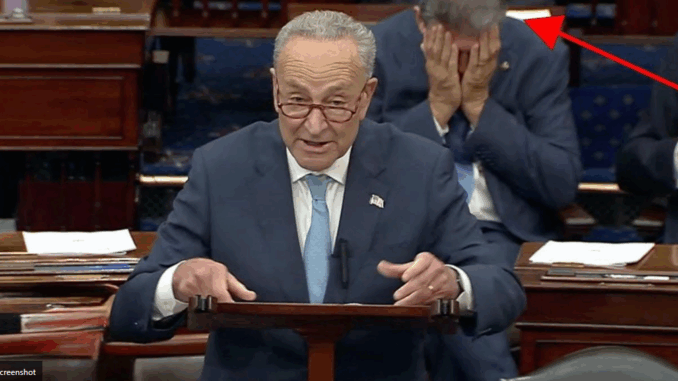
The U.S. Senate has approved President Donald Trump’s first and only nominee to the Boston-based federal appeals court. Until recently, most of the justices on this court were chosen by Democrats and often rejected his policy proposals.

The Republican-led Senate voted 52-46 along party lines to make Joshua Dunlap, a conservative lawyer from Maine who often worked on conservative legal cases, a life-tenured judge on the 1st U.S. Circuit Court of Appeals.
As of Thursday, that court was the only one of the 13 appeals courts without any active judges appointed by Republican presidents. That has helped make district courts in New England a popular place for Democratic state attorneys general and advocacy groups to file cases against Trump’s agenda.
In his first term, Trump didn’t name any judges to the 1st Circuit. At the start of his second term, he almost lost the chance to choose one when his Democratic predecessor, Joe Biden, put forth a nomination to fill a seat that U.S. Circuit Judge William Kayatta had held.
But Biden couldn’t get Julia Lipez confirmed as his candidate before he departed office. Kayatta, who Democratic President Barack Obama appointed, formally became a senior in October 2024, just days before the presidential election that delivered Trump back to the White House.
In July, Trump chose Dunlap, a partner at the legal firm Pierce Atwood, to fill the open position. He said that if the Senate confirmed him, he would “fearlessly defend our Constitution.”
Dunlap got his bachelor’s degree from Pensacola Christian College and then went to Notre Dame Law School, where he graduated in 2008. During law school, he worked as an intern with what is now known as the Alliance Defending Freedom, a conservative Christian legal rights nonprofit.
As a lawyer, he has worked on cases that have challenged Maine’s paid family and medical leave program, the state’s campaign finance rules, and the use of ranked-choice voting to run the state’s elections.
This is the second judge approved this week.
The U.S. Senate also confirmed a former clerk for conservative Supreme Court Justices Neil Gorsuch and the late Antonin Scalia to be a judge on the 9th U.S. Circuit Court of Appeals.
The Republican-controlled Senate voted 52 to 45 in favor of Eric Tung, a partner at Jones Day. This made him the first judge President Donald Trump selected for the San Francisco-based appeals court during his second administration.
His confirmation brings the total number of judges Trump appointed to the 9th Circuit from 2017 to 2020 during his first term to 10. This weakens the power of Democratic appointees, who have long held sway on a court that was previously thought to be the most liberal of all the federal appellate courts.
There are currently 16 Democratic appointees and 13 Republican appointees on the 9th Circuit, including Tung. In July, Trump nominated Tung to fill the seat that U.S. Circuit Judge Sandra Segal Ikuta had held. She stated in March that she would step down when a successor was named.
When Trump announced Tung’s nomination, he called him a “Tough Patriot” on social media and said he would preserve the Rule of Law in the “most RADICAL, Leftist States” like California, Oregon, and Washington. These are three of the nine states that the 9th Circuit has jurisdiction over.
Tung is a partner at the law firm Jones Day in Los Angeles. Before that, he was a federal prosecutor and worked for the U.S. Department of Justice.
Tung worked as a clerk for Gorsuch twice: once when he was on the 10th Circuit Court of Appeals and again after Trump confirmed him to the Supreme Court in 2017. He had also worked for Scalia, who passed away in 2016.
BREAKING NEWS Just hours ago, a tremendous fire broke out in…See more.

Just as the world slumbered, the ground beneath suddenly roared to life.
Without a hint of warning, the earth convulsed and cracked, sending shockwaves through sleeping towns. Buildings shuddered violently, some giving way entirely.
Barefoot and disoriented, people poured into the streets, their faces etched with fear. What began as a subtle tremor rapidly escalated into one of the most powerful earthquakes the region has seen in years—a terrifying ordeal that had only just begun.

In the early morning hours of Monday, a massive 7.7-magnitude earthquake struck near the China–Myanmar border.
The quake’s epicenter lay a mere 10 kilometers beneath the surface, according to the U.S. Geological Survey, unleashing violent shaking felt across southern China, northern Thailand, and parts of Myanmar.
Tragically, initial reports confirm dozens of lives lost and hundreds more injured, with countless others feared trapped under collapsed structures.
The quake’s reach extended far beyond its epicenter, rattling major northern Thai cities such as Chiang Rai and Chiang Mai, where panicked residents evacuated buildings en masse.
Rescue teams are battling immense challenges—damaged infrastructure, power failures, and broken communication networks—to deliver urgent aid.
Around the clock, emergency responders strive to provide shelter, medical attention, and relief to those caught in the disaster’s wake.
In Summary
As the devastation becomes clearer, the race to save lives intensifies. This powerful quake has left a wide swath of destruction across several countries, underscoring the critical need for swift international cooperation and humanitarian assistance. The hours ahead will be crucial in determining how many can be rescued and cared for……